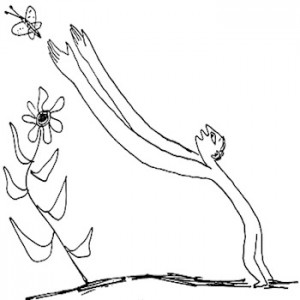[A snippet from a writing project in gestation, which will probably make very little sense if you haven’t read these other snippets: Square one, No importa, New tables, Belly of the beast, No turning back, & Memories, dreams, reflections.]
If there is some deadly disease that can be contracted from Mexican mosquitoes, even if the odds are one in ten billion, then it is a statistical certainty I will be infected within the next nine months. Neuve meses! Did you catch that! I told you there was a little “synchronicity” between Whipple and me that set these wheels to spinning. Well, there you have it.
I know what you’re thinking: I’m making the whole thing up. I’m Dr. Jeckyll and Whipple is Mr. Hyde (or vice versa). That’s just what my brother wrote when he commented on my blog the other day:
“You’ve got to change the writing style when you write as Whipple” he said. “He sounds too much like you.”
I know how this sounds, looks, smells. That’s why I need to make that trip to the coast, once I learn enough Spanish to fend for myself. Then I can get to the bottom of all this, or at least discover what my next step will be. In any event, I can’t rely on Molly to make sense of all this for me. Not only is she far too busy for such shenanigans, she’s also starting to look at me as if I’m losing my mind. Best to keep this thread to myself from this point on. I mean, between you and me.
Mosquitoes! You’d be nuts too if your entire body from head to toe – even within the tighty-whitey zone – was covered in bites. I’m being bitten as I write this. I moved the light back across the room, away from the bed, figuring it’s probably better not to see how many little vampires there are buzzing about. I can’t sleep for more than one or two hours at a stretch, as I’m either being eaten alive or else worrying about what might be getting under the sheets.
Between the skeeters and sleeplessness, I’ve fallen into another funk. It only takes one word from Juana to set me off. “Moli!” – I can tell by the tone that she’s about to piss in my raisin bran. This time she asked Molly for a loan of seven hundred pesos. We’ve covered this ground with her again and again. Crystal clear communication, so I’m told. It’s even the same word in both languages: No! It’s not even our money to loan/burn. We’ve only been here a few weeks and we’ve already dipped heavily into our meager reserves. Molly had paid for the construction of our room in advance, during a preliminary visit a few months ago. Just days before our arrival, Juana assured Molly that everything was proceeding according to plan–neglecting, of course, to mention that the plan had changed considerably. The new plan, Juana’s new plan, was to make the new guest room the size of a barn, doubling the amount of materials that would be needed. So we arrived to half a room — windowless, doorless, roofless, useless. We had limited choices at that point: Pay whatever it took to complete the room, spend nine months in the windowless bug trap between the kids’ room and their bathroom, or cut ties with them and find another host family. Since the nature of Molly’s research is entirely dependent on building trust with the community, she couldn’t risk an awkward break with Juana at this early stage of the game. Juana is attached to all the threads tying us to the pueblo. Juana the web weaver weaved the web, and we were caught in a sticky situation the moment we stepped off the bus. And since an extended stay in their already cramped quarters was both impractical and (for me) intolerable, we had to relent and pony up to complete the room.
Molly blunts my whining about Juana with appeals for cultural sensitivity, but the sense I get is crystal clear: Juana is taking advantage of us. Perhaps there are understandable, even honorable reasons. She does have three kids to feed. Perhaps it’s just a florid display of neurosis. Apparently she’s has a rough go of it in life so far. Whatever the case, she’s been the Queen of the Vampires, sucking the life-blood from us at every opportunity. If she says the room is finished, it’s nowhere near finished. If she says she’ll pay you back on Tuesday, she never pays you back. If you let her borrow some Clorox, she uses the entire bottle.
Jesús doesn’t seem to operate this way, although who knows what goes on behind the scenes. As is the case with Juana, the language barrier mostly restricts my reactions and responses to Jesús to the gut level, but his is a vibe I can definitely dig. He’s so unflappable and unassuming, always nodding his head and smiling, no matter the circumstances. Today I found a hundred-peso bill on the soccer field after his team finished practicing. I went to Jesús on the sly, giving him the chance to claim it as his own, but without batting an eyelash he called out to his amigos to see if anyone had lost the bill. In fact, no one claimed it, and I ended up donating it to the team’s “new uniform” fund. And all these guys are poor. Really poor. Molly and I have already visited with several families, mostly friends and extended family of Juana and Jesús, who live in pretty stark conditions, not sure where the next meal will come from or if it will come at all. Unlike Juana, these people (presumably) haven’t been told anything about our finances: that we’re living on a small research stipend, that we have a meager store of funds back in The States. Most folks probably assume we’re loaded, which, of course, is relatively true. Yet, not one of them — aside from Juana — has asked for so much as a peso.
So, there you have it. It’s not a cultural thing, this shifty game of “I’ll offer you a mouse-meat tamale today, then ask you for two thousand pesos tomorrow.” I can hear her gnashing her fangs in the next room, silk oozing from her spinnerets as she plots her next chop-licking meal of fine American cuisine.
If only these mosquitoes would stop sucking the compassion from my heart, maybe then I could let Juana out from under my skin. I might even discover that it’s not necessary to swat down everything that buzzes my ear or that walks the walls on the far side of the room. Just the other day, Peter, the oldest boy, told me that the lizards on the walls are really my amigos, that they too live to rid the room of bloodsuckers and vermin. I hadn’t thought of that, although instinctively I never once considered swatting a lizard. They’re too big and fleshy. I get squeamish just thinking about crushing a lizard, or a mouse, or a baby bird. Anything with hands or bones or blood is too close, too human-like, too much like me.
*
Soccer has been a saving grace. Play transcends language, and watching or playing fútbol with my amigos are the times when I feel most connected, most a part of an engaged, interpersonal reality. A goal is goal, no matter how you dress it up.
As I expected, they take their fútbol seriously here on the pueblo and, fortunately, I happened to dedicate a big chunk of my youth to the sport. At long last, I can relate. I love watching a good match, but it had been about fifteen years since I last laced ‘em up and played the game with my own two feet. I say, “it had been”, because this week I was recruited to play with Jesús as a full-fledged member of his equipo (team). As best I can understand, official league play began earlier this week, which involves ten teams from the surrounding pueblos. I practiced with the guys twice already, and yesterday watched the first game from the sidelines, as I’m not yet officially registered with the league.
Players range in age from about seventeen to mid-thirties, as far as I can tell. At thirty-six, that puts me on the fringe, and when you factor in the fifteen-year layoff, my surgically reconstructed right knee, and the difficulty I seem to have distinguishing one Mexican from another on the field, it all adds up to a rather humbling experience. I’m used to ruling the schoolyard when it comes to sports, but so far, here on the campo de pueblo, I’m barely holding my own.
It took me a while to figure this out, but during the practice scrimmages, the teams don’t decide who wears shirts and who goes shirtless until the first goal is scored. Then the team scored upon takes off their shirts, thus allowing me for the first time to distinguish between teammates and opponents. So for the first five, ten, twenty minutes – whatever it takes for the first goal to be scored – I’m swimming around like a Great White in a sea of Hammerheads, having not a clue in Kansas what’s going on around me. If the ball happens my way, I frantically search for Jesús among the other twenty or so brown-skinned guys with short black hair. The others don’t seem to have much trouble keeping tabs on me, especially if the shirt comes off. Even if the sun were to suddenly drop from the sky, the loud gasps for breath would surely give me away.
The kid with whom I’ve been primarily matched up against looks to be about seventeen, and he can run rings around me. At this point, I feel like I’m playing with lead boots in three feet of water. Yesterday I pulled a quad muscle while kicking the ball around with the kids after the team scrimmage. Suddenly I’ve become “Middle-aged Man,” hobbling home disgracefully every evening, wishing the freezer shelf of my dorm fridge could hold more than one bag of peas. I have to suck it up, though. I have to play through the pain. Not a million mosquitoes, not a million-peso loan request from Juana, can keep me off that field. It’s the only place around here where, for a fleeting moment at least, I feel like I belong, where people might take notice of me and think something other than “What’s that gringo doing here?”
It’s a fair question, to be sure, one that even I am struggling to answer with any degree of satisfaction. Eventually, I hope to figure this one out, if only as it relates to the campo de pueblo and the world of fútbol. “The beautiful game” is what they call it around the globe. Here in Mexico, it’s king —El Deporte Rey.
On the campo de pueblo, the laws of land are simple. Shirt on. Shirt off. Kick the ball. Use your head. Don’t use your hands. Goal! On the campo de pueblo, I know where I stand.
 It’s a been period of struggle, creatively, so it feels like parting with an enormous turd to get a tune out and into the world. Or a baby, or something. Yeah, a baby…
It’s a been period of struggle, creatively, so it feels like parting with an enormous turd to get a tune out and into the world. Or a baby, or something. Yeah, a baby…




